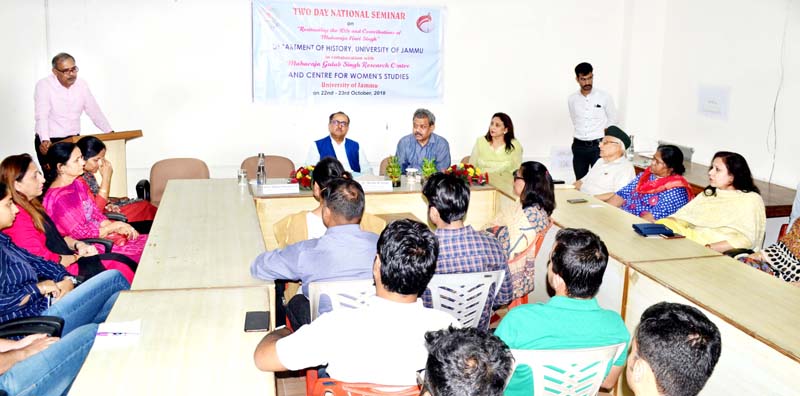Excelsior Correspondent
JAMMU Oct 23: The two-day national seminar on ‘Resituating the life and contributions of Maharaja Hari Singh’ concluded at the University of Jammu here today.
The proceedings of the day began with the fourth academic session in the morning on the theme historiography on Late Maharaja in which ten papers were deliberated upon, Prof Shailendra Singh Jamwal chaired the session.
This was followed by a panel discussion held under the chairmanship of Rahul Jalali. The panelists included Prof SS Jamwal, Prof Rizwan Qieser and Harbans Singh. Prof Suman Jamwal opened the session for the panel discussion and warmly welcomed the dignitaries and the audience.
Jalalai raised the questions why has it become this important to revisit and resituate Dogra rule and Maharaja Hari Singh’s contributions? Why has it become important to go back in time to in detail analyze the Dogra rulers and their contributions in the continuing historical discourse? He also pointed out why the cultural heritage of the Dogras and the institutions that were built over time has been neglected.
Harbans Singh quoted various literary texts to best define Maharaja Gulab Singh who, he mentioned, carved out the empire at the tip of his soul. He also stressed upon revisiting the history of Jammu and Kashmir and not to look upon its narrative in separation from the Pan Indian level.
Prof Quasar emphasized on the logical understanding of history of Jammu before the accession of the throne by Maharaja Gulab Singh, where he predominantly raised that before Maharaja Gulab Singh there were rulers who were not so sensitive to the otherwise highly sensitive issues viz. infanticide, education status of women, etc.
Prof Jamwal stated that the history of J&K is interconnected and interwoven with the webs of Punjab , India and British. He stretched his discussion from Maharaja Ranjit Singh to the Muslim Reading Room Party where he in detail talked about the Treaty of Amritsar, the accession of throne by Mahararaja Gulab Singh after the death of his father, acquisition of Kashmir over a financial agreement with the British, appointment of British residents in the State, and more.
The panel discussion was following by a discussion in which several participants raised questions.
Trending Now
E-Paper


